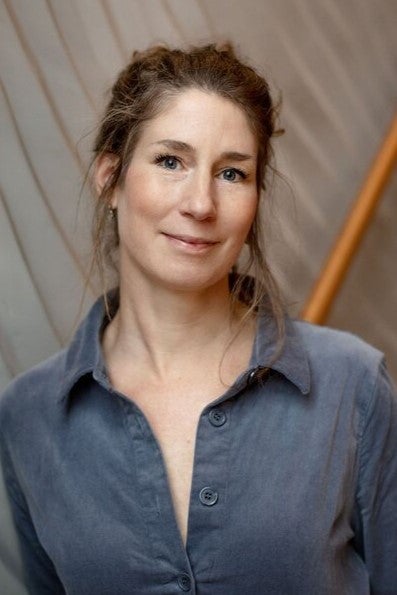Although, according to Karin, the financial sector has not always had the best name in the field of sustainability, Cardano was a very logical choice for her. Cardano provides risk management, such as interest rate hedging, for pension funds and insurers. She says: ‘Everyone who works here is driven to contribute to a sustainable world.’ On the one hand, sustainability is an important theme in the financial products for pension funds. ‘The bonds we use for interest rate hedging are increasingly green and social. We invest in these bonds to support energy transition, for example, or to stimulate employment within Europe,’ says Karin. ‘On the other hand, I am also involved in sustainability within the organisation. Think, for example, of sustainable travel, the elimination of plastic bottles and the recycling of desks.’
Nothing new
Karin takes the environment and society into account in everything she does. ‘In the past, you wouldn't necessarily label that as sustainable. In the meantime, a common language has emerged and many things that you already did as an organisation now fall within the ESG (environmental, social and governance) criteria.’ When she started in her current position two years ago, she immediately noticed how motivated people are to make a positive impact. ‘Especially with young people, sustainability is self-evident, while the older generations you see that they can still be somewhat traditional. But they also feel that urgency more, through children and grandchildren. What kind of world are you leaving for them?’
‘The market is growing very fast, and you see that people are increasingly vocal about sustainability,’ says Karin. And that's a good thing: ‘The climate crisis is a very urgent problem. You can't solve that anymore by staying in the background.’ Cardano also states the importance of sustainability prominently on its agenda. And although one pension fund develops faster in the field of sustainability than another, Karin sees that it is on everyone's agenda. ‘For a long time, Dutch pension funds were ahead of English pension funds, but they are catching up.’
Together
While she first thought, 'This is my theme, I want to excel in this', she is now quite happy that there are more companies that are becoming more sustainable. ‘This is not something you solve on your own. Full attention is needed for this subject, otherwise you won't find a solution.’ And according to Karin, we still have a long way to go. This development is not only welcome in the commercial sector. ‘The government also plays an important role in this. We need everyone.’
The European Union aims to be climate neutral by 2050. Karin also implements this aim in her work. ‘We want to have a CO2-neutral investment portfolio. As a company we are already neutral, which is not that difficult in the financial sector. You don't produce anything physically, so you hardly have any emissions,' says Karin. The challenge lies in the investments. ‘Of course, you can exclude all companies that emit a large amount, but that doesn't change anything in the world. To bring about change, it is extremely important to start a conversation with each other and to say why sustainability is so important to you as an investor.’
Challenge
Sustainable entrepreneurship is ultimately better for every company. After all, companies that are prepared for the future will ultimately benefit from it. But in some ways, it can be challenging. ‘Sustainability includes not only climate, but also social issues. Social and environmental can clash; for example, reducing emissions can encourage social pressure where you would rather not have it.’ All in all, quite complex.
‘You often see that agreements regarding sustainability are watered down, and that is such a shame. Sustainability is sometimes just difficult to measure. While a ton of carbon is the same everywhere, social issues and biodiversity are very different locally and culturally. That sometimes makes it difficult to make global progress.’ But that's no excuse: ‘If you make commitments that don't hurt, they're not worth that much. It needs to be hard, otherwise nothing will change.’ Moreover, progress must be fair. ‘Emissions are mainly caused by and for richer countries. It is unfair to impose the same costs and sustainability requirements on developing countries as on richer countries. Together we have to ensure that the bill ends up with the right groups.’
Proud
Taking small steps together. That's what it's all about. ‘If I have had a good conversation with a customer and they decide to become more sustainable based on that, I am very happy.’ Within the organisation, there is a network of about forty people who are involved in sustainability: the so-called sustainability champions. Karin provides bi-weekly education sessions for them. ‘It is important that people are educated and know what is going on. In this way you create unity and common goals.’
And you can also take those steps outside of work. ‘I really grew up with the idea that a better environment starts with yourself,’ says Karin. This mainly concerns the impact you have on your environment. ‘The fact that you don't eat that piece of meat may not make the difference itself, but that others see that you don't it does. So don't underestimate what you can do on a personal level.’
